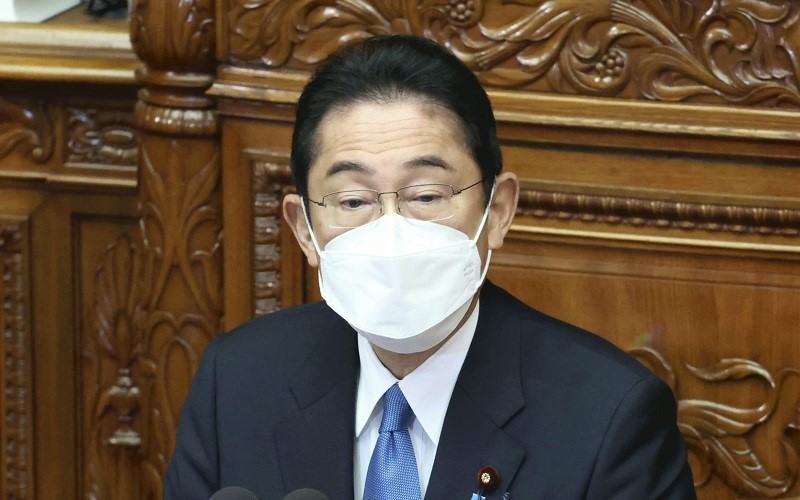Japan government, ruling parties make concessions to opposition over key legislation

Prime Minister Fumio Kishida responds to a question at a plenary session of the House of Representatives on Tuesday.
17:02 JST, December 7, 2022
A bill meant to remedy and prevent damage as a result of large donations to religious organizations has been submitted to a plenary session of the House of Representatives for deliberation. The government and the ruling parties are aiming to have the bill passed into law during the current Diet session. The House of Representatives Special Committee on Consumer Affairs decided Wednesday to vote on the bill in the lower house after Prime Minister Fumio Kishida attends a Thursday meeting to discuss it.
The bill has followed an unusual course to this point — the government consulted with both the ruling and the opposition parties on the legislation before getting Cabinet approval, and the Liberal Democratic Party presented a draft amendment to the opposition side on Monday.
Kishida’s in-depth answer
“Donations made through so-called ‘mind control’ can be said, in many cases, to have been solicited by [an organization] taking advantage of [a follower’s] anxiety, and therefore are eligible to be nullified,” Kishida said clearly at a plenary session of the lower house on Tuesday.
The relief bill covers businesses and organizations’ solicitation of donations from individuals. It prohibits six types of acts aimed at cornering individuals, including so-called spiritual sales tactics that involve manipulating people into buying goods by claiming the goods bring supernatural benefits.
The bill also requires businesses and organizations to consider three points, including “not suppressing individuals’ free will and thereby making it difficult for them to make appropriate judgments.”
The Constitutional Democratic Party of Japan and Nippon Ishin no Kai (Japan Innovation Party) have advocated for the restriction of donations that individuals make as a result of emotional manipulation. However, the government and the ruling party had excluded this from the list of prohibited acts, as “it is difficult to define and restrict such acts by law because they involve the inner feelings of the individual,” a senior LDP official said.
Kishida went as far as he did in his answer because he wanted to “get the bill smoothly passed into law by winning even the opposition parties’ cooperation and thus ease criticism of the administration,” said a source close to Kishida.
During the interpellations on Tuesday, CDPJ member Michiyoshi Yunoki again demanded changes to the bill. “There will be a greater chance of actually helping people if the provision requiring organizations to consider certain matters [when seeking donations] is changed to prohibit such acts,” Yunoki said.
Kishida expressed his position that requiring consideration allows the legislation to cover a broader range of acts than outright prohibition, and argued that the bill will make it easier to claim damages under the Civil Code in connection with an unlawful act.
Stresses effectiveness
Another point of contention is whether the relief bill can help past victims.
“What kind of relief will be provided [under the new law] for those who have already been victimized?” asked Joji Uruma of Ishin.
Kishida responded, “In principle, [the legislation] applies to solicitations that take place after the law has come into force.” However, the prime minister also stressed the effectiveness of the bill, saying, “The obligation to consider [three points] might be taken into account in court cases related to damage suffered in the past.”
After the passage of the bill, the government intends to do its utmost to help victims by ensuring the smooth implementation of the law, including clarifying the interpretation of its articles.
“We will properly clarify the criteria as soon as possible so that the new law will function well,” said Taro Kono, minister for consumer affairs.
The relief bill has drawn a certain amount of praise from experts.
Yoshihide Sakurai, a professor at Hokkaido University and a scholar of the sociology of religion, said the bill was “meaningful because it can prevent the inappropriate solicitation of donations. The content of the bill can be considered sufficient to allow the negation of donations made as a result of emotional manipulation.”
However, Sakurai also cited the need to establish a provision requiring that receipts be issued for donations. “If it can’t be proved that a donation was made, it’s impossible to claim damages,” he said.
Tomoyuki Mizuno, a professor at Hosei University and a scholar of criminal law, said: “There is no difference between the effectiveness of prohibiting certain acts and requiring consideration. The law’s effectiveness should be increased by racking up specific cases.”
Top Articles in Politics
-

Japan PM Takaichi’s Cabinet Resigns en Masse
-

Sanae Takaichi Elected Prime Minister of Japan; Keeps All Cabinet Appointees from Previous Term
-

Japan’s Govt to Submit Road Map for Growth Strategy in March, PM Takaichi to Announce in Upcoming Policy Speech
-

LDP Wins Historic Landslide Victory
-

LDP Wins Landslide Victory, Secures Single-party Majority; Ruling Coalition with JIP Poised to Secure Over 300 seats (UPDATE 1)
JN ACCESS RANKING
-

Producer Behind Pop Group XG Arrested for Cocaine Possession
-

Japan PM Takaichi’s Cabinet Resigns en Masse
-

Japan Institute to Use Domestic Commercial Optical Lattice Clock to Set Japan Standard Time
-

Man Infected with Measles Reportedly Dined at Restaurant in Tokyo Station
-

Israeli Ambassador to Japan Speaks about Japan’s Role in the Reconstruction of Gaza























